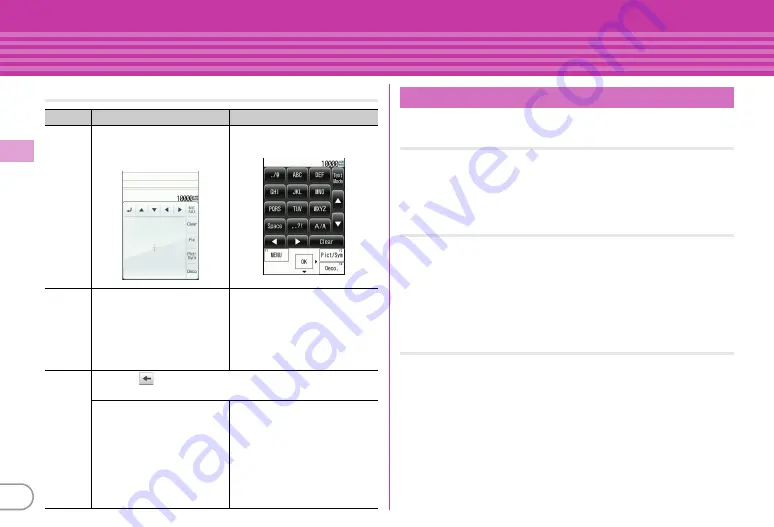
32
Ba
si
c O
p
e
ra
tio
n
Entering characters with touch operation
Switching input modes varies by the input method.
5-touch or 2-touch input method
Each time you press
I
on the character entry screen, the input
mode switches as "One-byte number"
⇒
"Hiragana/Kanji"
⇒
"One-
byte katakana"
⇒
"One-byte alphabet"
⇒
"One-byte number"
…
.
・
j
switches two-byte or one-byte characters.
Roman letters input (for entering Japanese)
Each time you press
3
on the character entry screen, the input
mode switches as "One-byte number"
⇒
"Hiragana/Kanji"
⇒
"One-
byte katakana"
⇒
"One-byte alphabet"
⇒
"One-byte number"
…
.
・
Any of
U
,
D
,
7
switches two-byte or one-byte characters.
・
For Roman letters input, input mode icon for "Hiragana/Kanji",
"One-byte katakana" and "Two-byte katakana" accompany "R".
Input with touch keys
When [TextMode] is touched, the input mode list is displayed, and
touch any of [Kana] [Alphameric] [Num] [Katakana] [Symbol S]
[Symbol L] to switch the input mode.
・
When input mode is [Kana], [Alphameric], [Num] or [Katakana],
[
A
/A] switches one-byte or two-byte characters.
Handwriting input
Touch key input
Outline
Write characters with your
finger in the hand writing
entry area
Select a character with touch
operation
Example
(in
hiragana
/kanji
mode)
Write "
六
", "
本
", and
木
" in
order in the hand writing
entry area.
"
ろ
" :
[
ら
9]
e
[
ろ
]
"
っ
" :
[
た
4]
e
[
っ
]
"
ぽ
" :
[
は
6]
e
[
゛゜
] (twice)
e
[
ぽ
]
"
ん
" :
[
わ
0]
e
[
ん
]
"
ぎ
" :
[
か
2]
e
[
゛゜
]
e
[
ぎ
]
Operations
during
entry
[Clear] or
:
Delete 1 character at the cursor position (after
the entry is fixed)
[Clear] :
Delete recognized
characters
[Close] :
Close the
conversion options list
[Corr] :
Rewrite a character
[A/a] :
Switch upper/lower
case
[Back
]
:
Return to the first
level of each input mode on
the character entry screen
[PrevPage]/[NextPage] :
Display the previous/next
symbol list
Switching input modes








































